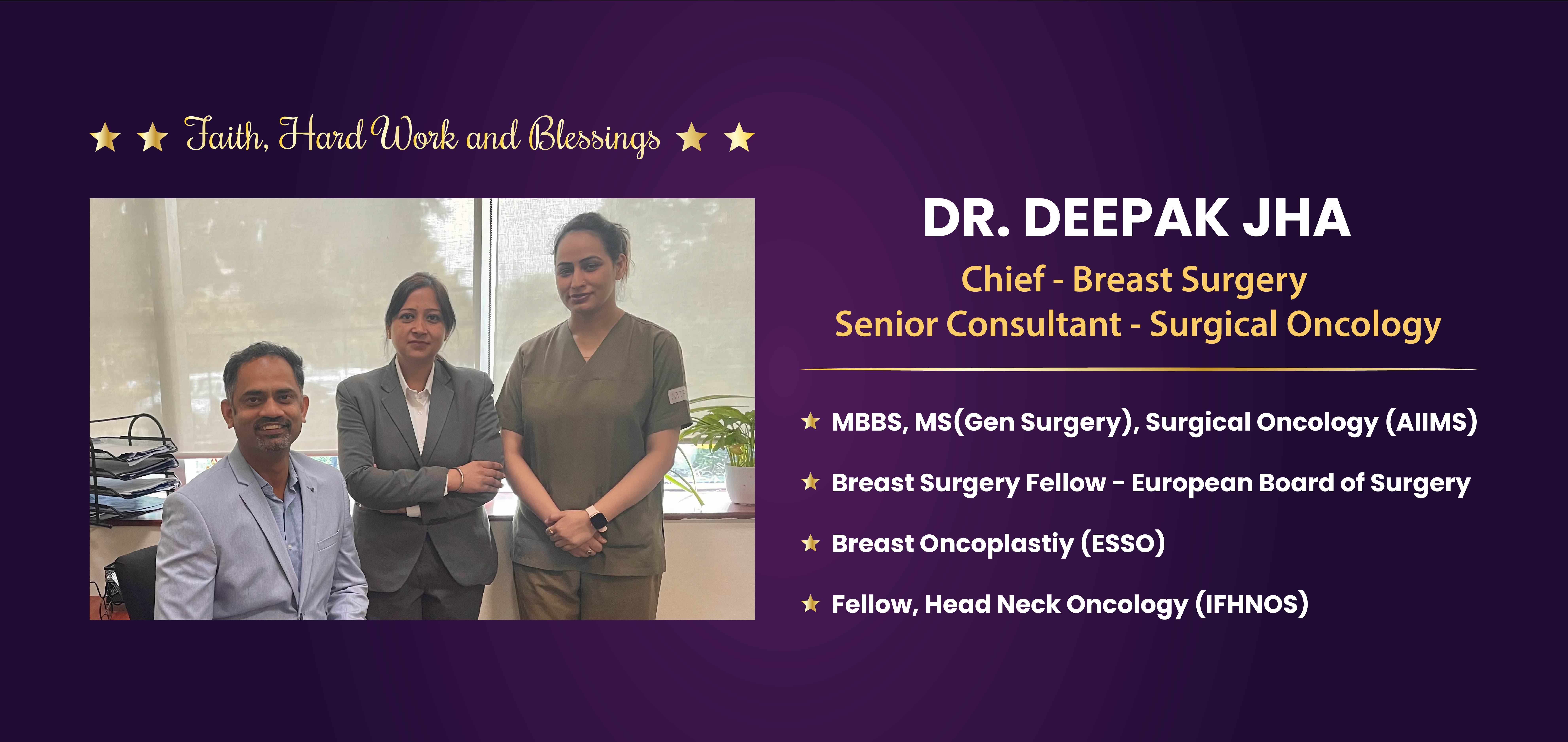About Me
Dr. Deepak Jha
Chief - Breast Surgery
Senior Consultant: Department of
Onco-Surgery
Artemis Hospital, Gurugram
Why come to me?
- Trained cancer surgeon focusing only on breast cancer.
- 12+ years of experience in Breast conservation and reconstruction.
- Believe and practice a “patient-first” approach.
- Counsel and recommend in your fight against cancer like a family member/ friend











What is breast cancer, and how does it develop?
Breast cancer, a multifaceted illness caused by mutations in the genes that control cell growth within the breast tissue, leads to the formation of malignant tumors. Its development is influenced by a combination of genetic predispositions, environmental conditions, and lifestyle choices, as noted by Dr. Deepak Jha:
What are the different types of breast cancer?
Breast cancer can be classified into several types, based primarily on where the disease begins and its growth patterns. The most common types include:
Dr Deepak Jha is recognized as a leading breast cancer doctor in Gurgaon, offering comprehensive care and support.
Who is most at risk for developing breast cancer?
Certain factors increase the risk of developing breast cancer, making some individuals more susceptible, according to a breast cancer specialist in Gurgaon. Key risk factors include:
Dr. Deepak Jha offers expert treatment plans & personalized care for breast cancer patients, ensuring the best possible outcomes.
What are the early warning signs and symptoms of breast cancer?
Early detection of breast cancer significantly enhances the success rate of breast cancer treatment in Gurgaon. Here are some of the early warning signs and symptoms:
How is breast cancer diagnosed?
Breast cancer is diagnosed through a combination of clinical examinations and specialized tests designed to detect and evaluate the nature of breast changes. Essential diagnostic methods include:
What are the treatment options for breast cancer?
Breast cancer treatment varies with cancer type, stage, overall health, and patient preferences, says a surgeon in Gurgaon. Treatments often combine therapies:
What are the potential side effects of breast cancer treatment?
Breast cancer treatments, while effective in combating the disease, can come with a range of side effects. These vary depending on the type of treatment but may include:
What is the long-term outlook for someone with breast cancer?
The long-term outlook for patients treated by a breast cancer doctor in Gurgaon has significantly improved due to advancements in detection and treatment. Key points include:
Are there ways to prevent breast cancer?
While it's not possible to completely prevent breast cancer, adopting specific lifestyle changes can significantly lower your risk, as per a breast cancer specialist in Gurgaon. Key recommendations include:
What are the benefits of early detection of breast cancer?
Early detection of breast cancer improves treatment success and survival rates in Gurgaon. Benefits include:
Is there a difference in breast cancer symptoms for men vs women?
Breast cancer, often seen as a woman's disease, also affects men. Dr. Deepak Jha, a leading breast cancer surgeon in Gurgaon, points out that symptoms in men and women are similar, but their detection and perceived importance can differ. Key points include:
How does breast cancer affect fertility?
Breast cancer and its treatment can significantly impact fertility, a vital consideration addressed by Dr. Deepak Jha for patients planning families post-recovery. Key impacts include:
What are some lifestyle changes that can help reduce the risk of breast cancer?
How does age influence the likelihood of developing breast cancer?
Age is a significant risk factor for developing breast cancer. Here's how it plays a role:
What is the role of genetics in breast cancer?
Genetics plays a significant role in breast cancer, with inherited gene mutations accounting for approximately 5-10% of all cases. Key points include:
What is the role of genetics in breast cancer?
Hormone receptor status is crucial in determining the best treatment for breast cancer. Breast cancers are tested for estrogen and progesterone receptors to identify if they are hormone receptor-positive (HR+), which is the most common type and responsive to hormone therapy, or hormone receptor-negative (HR-), which requires alternative treatments like chemotherapy or radiation. Triple-negative breast cancer, lacking three key receptors, faces limited treatment options, primarily chemotherapy and radiation.
What are the limitations of breast cancer screening?
Breast cancer screening, while a crucial tool in early detection, does have its limitations:
What should I do if I find a lump in my breast?
If you discover a lump in your breast, the most crucial step is to see a doctor as soon as possible. Here's what to do:
How can I cope emotionally with a breast cancer diagnosis?
Receiving a breast cancer diagnosis can be overwhelming. Here are strategies to help manage the emotional impact:
What are the latest advancements in breast cancer research?
Recent breakthroughs in breast cancer research have provided new hope and possibilities for treatment strategies: